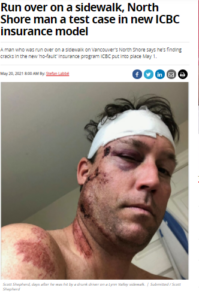There have been a lot of terrible stories in recent weeks of pedestrians, cyclists and other road users suffering tragic injuries and even death at the hands of reckless motorists. I will not link to any individual stories as I don’t want to use personal tragedy as a talking point. Accept with a quick google news search you can verify this as fact.
Many of these victims are learning the hard reality that their rights to sue for compensation for their profound losses have been taken away.
The BC government stripped victims’ rights to sue careless and even reckless drivers for almost all crashes after May 1, 2021. I’ve been fielding more calls than I like explaining this to people. The BC Government conveniently left themselves a talking point pretending that if the at fault motorists actions amount to criminal behaviour victims can still sue. However, this is at best a half truth. Let’s break this down –
The BC no-fault scheme takes away victims rights to sue at fault drivers. Section 116(2)(f) of the Insurance (Vehicle) Act then carves out an exception for criminal drivers. So if you can prove that the driver that injured you was committing a crime at the time you can sue them right? Nope. It takes more than just that and its out of your hands. Not only do they need to be committing a crime (from a very narrow ‘prescribed’ list) they need to be convicted of that crime. This means that
- after a crash the police need to attend (remember the government passed a law saying police don’t have to attend most crashes)
- After gathering evidence the police must conclude that a prescribed criminal charge is warranted (the police have many options to charge motorists with provincial offences instead of criminal charges. In fact the majority of the time when police conclude charges are warranted this is exactly what they do even for drunk and otherwise impaired drivers!)
- Crown counsel must then conclude that sufficient evidence exists to approve the prescribed Criminal charge
- No plea bargain to a lesser offence (such as a provincial offence which is how many of these cases end up being dealt with) can be reached
- Lastly a conviction must be secured for the prescribed offence
Unless the government gets all of the above steps right you are out of luck. It does not matter if you are maimed. It does not matter if a loved one died. It does not matter if the at fault driver actually was committing a prescribed crime at the time and you can prove it. Unless the government decides to do everything right and actually gets it right you simply do not have the right to sue the at fault motorist.
And if that’s not enough the government only allows victims in these very narrow circumstances the right to sue the at fault driver for “non-pecuniary damages and punitive, exemplary or other similar non-compensatory damages” instead of damages for all their actual losses.
Below is the very narrow list of ‘prescribed offences’ committed after December 18, 2018 that trigger a victim’s right to sue:
Schedule 10 – Prescribed Conditions
“motor vehicle related Criminal Code offence” means any of the following offences that an insured commits while operating or having care or control of a vehicle or by means of a vehicle:
(a)an offence under section 220 or 221 of the Criminal Code;
(b)an offence committed before December 18, 2018 under any of the following provisions of the Criminal Code:
(i)section 249;
(ii)section 252;
(iii)section 253 (1) (a);
(iii.1)section 254 (5);
(iv)section 255 (2);
(v)section 255 (3);
(vi)section 259 (4);
(c)an offence committed on or after December 18, 2018 under any of the following provisions of the Criminal Code:
(i)section 235;
(ii)section 236;
(iii)section 239 (1);
(iv)section 320.13 (1);
(v)section 320.13 (2);
(vi)section 320.13 (3);
(vii)section 320.14 (1) (a);
(viii)section 320.14 (1) (b);
(ix)section 320.14 (1) (c);
(x)section 320.14 (1) (d);
(xi)section 320.14 (2);
(xii)section 320.14 (3);
(xiii)section 320.15 (1);
(xix)section 320.15 (2);
(xx)section 320.15 (3);
(xxi)section 320.16 (1);
(xxii)section 320.16 (2);
(xxiii)section 320.16 (3);
(xxiv)section 320.18 (1).

